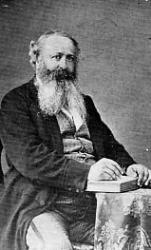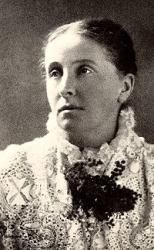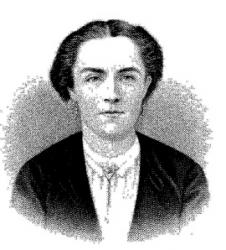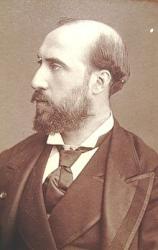Planning worship?
Check out our sister site, ZeteoSearch.org,
for 20+ additional resources related to your search.
- |
User Links
Person Results
‹ Return to hymnal



Export as CSV
Salvatore Ferretti

1817 - 1874 Hymnal Number: 23 Composer of "ENDSLEIGH" in Church Hymnal Born: September 15, 1817, Florence, Italy.
Died: May 4, 1874, Florence, Italy.
Buried: English Cemetery, Florence, Italy.
Ferretti, Salvatore (b. 1817, d. 1874), lived for a time in England, where he edited a journal entitled, L'Eco di Savonarola, and in 1850 published Inni e Salmi ad uso dei Cristiani d' Italia (Lond., Partridge and Oakey). He afterwards returned to Florence, where he established a Protestant orphanage. Six of his hymns are in common use.
--John Julian, Dictionary of Hymnology, Appendix I (1907)
Salvatore Ferretti
Gustav Friedrich Ludwig Knak
1806 - 1878 Person Name: Gustav Knack Hymnal Number: 491 Author of "Ne'er a soul did perish, who was trusting God" in Church Hymnal Knak, Gustav Friedrich Ludwig, son of Christian F. L. Knak, Justiz Commissarius at Berlin, was born at Berlin, July 12, 1806. He matriculated as a student of theology at the University of Berlin, Easter, 1826. In the autumn of 1829 he became tutor in a private school at Königs-Wusterhausen, near Berlin, where he worked manfully for the sick and dying during the cholera year 1831. He returned to Berlin in August, 1832, and acted as one of the editors of the well-known Geistlicher Lieder Schatz (referred to in this Dictionary as the Berlin Geistlicher Lieder Schatz), to which he contributed a number of hymns, and for which he wrote the preface dated Dec. 11, 1832. In the autumn of 1834 he was ordained pastor of Wusterwitz, near Dramburg, in Pomerania; and in the end of 1849 was appointed Gossner's successor as Pastor of the Lutheran-Bohemian congregation (Bethlehemskirche) in Berlin. During a holiday visit to a married daughter at Dünnow, near Stolpemünde, he was taken suddenly ill, and died there July 27, 1878; his body being removed to Berlin and laid to rest in the graveyard belonging to his church (O. Kraus, 1879, p. 266; Allgemeine Deutsche Biographie, xvi. 261, &c).
Knak was a man of prayer, a faithful and successful preacher and pastor, and greatly interested in Missions at home and abroad, especially in the Lutheran missions to China and the Chinese Orphanage at Hong Kong. As a hymn-writer he is distinguished by elegance of style, harmony of rhythm, and deep love to the personal Christ. His hymns appeared in his Simon Johanna, hast du mich lieb? Berlin, 1829 (enlarged editions pub. at Berlin 1840, and again in 1843 as his Zionsharfe); in the Berlin Geistlicher Lieder Schatz, ed. 1832; and in his Liebe urn, Liebe . . . Nachtrag zu dessen Zionsharfe. Werder, 2nd ed. 1849 (3rd ed. Berlin, 1850).
Those of Knak's hymns which have passed into English are:—
i. Lasst mich geh'n, lasst mich geh'n. Longing for Heaven. Of the origin of this favourite hymn, 0. Kraus, 1879, p. 269, gives the following account:—
"Knak's earnest zeal in the cause of missions to the heathen had the natural result, that for many years he was summoned as festival preacher to the most distant Mission services. On the way to fulfil these engage¬ments many of Knak's hymns had their origin. About 1845, one day the pastor of Wusterwitz [his cure] came to pastor Sondermann at Coprieben, and asked him to play the well-known popular melody 'Morgenroth, orgenroth,' as he had just composed a hymn to that tune. As the desired melody rang out, the poet struck up for the first time that hymn since sung by hundreds of thousands, *Lasst mich geh'n! Lasst mich geh'n.” Later, Knak's blind organist, Voigtlander, in Berlin, composed the pleasing melody, to which at the present time the hymn is generally sung."
This hymn appears to have been written on July 23, 1846, and is included in his Liebe um Liebe, 1849 (3rd ed., 1850, No. 48), in 5 stanzas of 5 lines, entitled "Longing after Jerusalem." It soon attained wide popularity, and is given as No. 1597 in the Berlin Geistlicher Lieder Schatz, ed. 1863. Translated as:—
1. To the sky, to the sky. A good and full translation by J. M. Sloan, contributed to J. H. Wilson's Service of Praise, 1865, No. 165, and Songs of Zion, 1878, No. 94; in both cases set to Voigtländer's melody.
2. Let me go, let me go, Jesus, face to face, to know. In full, by Mrs. Edmund Ashley, in the British Herald, Sept., 1867, p. 139; repeated in Reid's Praise Book, 1872. In the Christian Hymns, Adelaide, 1872, No. 347 begins with st. ii. "Glorious light, glorious light."
Other translations are, (1) "Let me close, let me close," as No. 12 in Heart Melodies , Lond., Morgan, N.D., signed “A. P. E. J." (2) "Let me flee, let me flee," by E. Massie, 1866. (3) "Let me go, let me go, Lord to me," by Mrs. H. R. Spaeth, in the Southern Lutheran Service & Hymns for Sunday Schools , Philadelphia, 1883. (4) "Let me go! ah, let me go," by J. Kelly, 1885.
Other hymns by Knak which have been translated into English are:—
ii. Herr, du hast uns reich gesegnet. Close of Divine Service. Zionsharfe, 1843, No. 92, in 2 st. Tr. as "Lord, we've tasted Thy rich blessing," in L. Rehfuess's Church at Sea, 1868.
iii. Ich bin ein Pilger Gottes hier auf Erden. Pilgrimage of Life. Liebe um Liebe, 3rd ed. 1850, No. 45, in 4 stanzas. Translated as "God's pilgrim am I here, on earth below," by J. Kelly, 1885.
iv. Jesus sei mit dir auf alien Wegen. Birthday wish. Liebe um Liebe, 3rd ed. 1850, No. 36, in 22 lines. Tr. as (1) "Jesus be with thee in thy ways, Jesus favour," in L. Rehfuess's Church at Sea, 1868. (2) “Jesu be with thee in all thy ways, Jesu crown," by J. Kelly, 1885.
v. Mit der Sehnsucht heissen Blicken. Love to Christ. Zionsharfe, 1840, p. 4, in 6 stanzas. Translated as "With the glow of ardent longing," by Miss Burlingham, in the British Herald, Sept. 1865, p. 141.
vi. Sei getrost, o Seele. Cross and Consolation. Zionsharfe, 1840, p. 2, in 3 stanzas. Translated as "O my soul, be comforted, Give not," by J. Kelly, 1885.
vii. Wenn Seelen sich zusammenflnden. Communion of Saints. Berlin Geistlicher Lieder Schatz, ed. 1832, No. 1857, in 5 stanzas. Tr. as "When they may chance to meet together," by Dr. H. Mills, 1845 (1856, p. 186).
viii. Zieht im Frieden eure Pfade. Farewell. Zionsharfe, 1843, No. 86, in 11 lines. Tr. as "Now in peace go on your ways," in L. Rehfuess's Church at Sea, 1868. [Rev. James Mearns, M.A.]
--John Julian, Dictionary of Hymnology (1907)
Gustav Friedrich Ludwig Knak
Adolph Baumbach
1830 - 1880 Hymnal Number: 496 Composer of "[Let the words of my mouth and the meditations of my heart]" in Church Hymnal Baumbach, Adolph was born about 1822 in Sachsen, Germany. He was a pianist and organist. About 1844 he emigrated to the United States and was a professor and teacher of music in Boston. In 1858-1860 he served as organist of Rev. Dr. Putnam's Church in Roxbury. He later taught music in Chicago and was an organist at Grace Church there. He died on April 3, 1880 in Chicago, Illinois.
NN, Hymnary editor. Sources: composers-classical-music.com/b/BaumbachAdolph.htm and www.hymntime.com/tch/
Adolph Baumbach
Mary L. Stocks
Person Name: M. L. Stocks Hymnal Number: 231 Composer of "WHAT WILL YOU DO WITH JESUS?" in Church Hymnal
Mary L. Stocks
Ada Cambridge

1844 - 1926 Person Name: Ada Cross Hymnal Number: 23 Author of "The dawn of God's dear Sabbath" in Church Hymnal Cross, Ada, née Cambridge, daughter of Henry Cambridge, born at St. Germaine, Norfolk, Nov. 21, 1844, and married, in 1869, to George Frederick Cross, who, in 1870, took Holy Orders as a curate in England, and subsequently, after holding various curacies in Australia, became, in 1877, Incumbent of Coleraine, in the diocese of Ballarat. Her works include Hymns on the Holy Communion, 1866; Hymns on the Litany, 1865, &c.; and she has also contributed to Lays of the Pious Minstrels, 1862; English Lyrics, &c.; and published a prose story, "The Two Surplices,” 1865, and tales in various magazines. Her hymns have attained to some popularity, and are characterized by great sweetness and purity of rhythm, combined with naturalness and simplicity. The best known are:—
1. Humbly now with deep contrition. 1865. Lent.
2. Jesus, Great Redeemer. 1866. Holy Communion.
3. Light of the world, O shine on us. 1865. Domestic Worship.
4. Saviour, by [to] Thy sweet compassion. Lent.
5. The dawn of God's dear Sabbath, 1866. Sunday Morning.
--John Julian, Dictionary of Hymnology (1907)
Ada Cambridge
Ernest Bourner Allen
1868 - 1931 Person Name: Rev. Ernest Bourner Allen Hymnal Number: 353 Author of "The Son of God goes forth for Peace" in Church Hymnal
Ernest Bourner Allen
Mrs. Will L. Murphy
Hymnal Number: 349 Author of "Constantly abiding, Jesus is mine" in Church Hymnal
Mrs. Will L. Murphy
Charles A. Tindley, Jr.
Person Name: Chas. A. Tindley, Jr. Hymnal Number: 274 Arranger of "LEAVE IT THERE" in Church Hymnal Son of Charles Albert Tindley. Charles Albert Tindley, Jr., arranged some of his father's hymns.
Charles A. Tindley, Jr.
Rebecca S. Pollard

1831 - 1917 Hymnal Number: 289 Author of "I surrender all" in Church Hymnal Pseudonyms: Kate Harrington
Born: September 20, 1831, Allegheny City, Pennsylvania.
Died: May 29, 1917, Ft. Madison, Iowa.
Buried: Farmington, Iowa.
A teacher, writer and poet, Pollard spent her most productive years in Iowa. Her father, Professor N. R. Smith, was a playwright and authority on Shakespeare. She was married to New York poet and editor Oliver I. Taylor. She was the anonymous author of Emma Bartlett, or Prejudice and Fanaticism, a fictional reply to Uncle Tom’s Cabin, intended to expose the hypocrisy of Know-Nothingism.
Pollard’s family moved to Ohio, then Kentucky, where she worked as a teacher. Later, she taught in Chicago, Illinois. Pollard lived in various Iowa cities, including Farmington, Keosauqua, Burlington, Ft. Madison and Keokuk. She began her writing career with the Louisville Journal, whose editor opposed secession and was an important influence in keeping Kentucky in the Union.
In her Letters from a Prairie Cottage, Pollard included a children’s corner with tales about taming and raising animals and of a cat who adopted orphan chicks. Pollard also wrote other children’s books, including a primer and a speller. Pollard’s work in the field of reading represented a pioneer effort to create a sequential reading program of intensive synthetic phonics, complete with a separate teacher’s manual and spelling and reading books, and moving into a broad based graded series of literature readers. Her series is important for its high correlation of spelling and reading instruction, for its concern for the interests of children, for its incorporation of music into the process of learning to read, and as the forerunner for other phonics systems. Her readers were used in every state in America and were used in Keokuk, Iowa, as late as 1937. Few women have single-handedly contributed so much to the field of reading.
In 1869, Pollard published a book of poems titled Maymie, as a tribute to her ten year old daughter who died that year. She followed up the next year with In Memoriam, Maymie, April 6th, 1869, a meditation on death and suffering
Emma Bartlett received mixed reviews when it was published in 1856. The Ohio Statesman gave a very good review, but the Cincinnati Times said, "We have read this book. We pronounce the plot an excellent one and the style charming, but she has failed to fulfill the intended mission of the book." It accused her of also showing prejudice and fanaticism typical of the politicians she tried to defend.
In 1876, she published Centennial, and Other Poems to commemorate the 100th anniversary of the American Declaration of Independence, and the Centennial Exposition in Philadelphia, Pennsylvania, the first official World’s Fair held in the United States. The volume included many poems about Iowa, selected poems of Pollard’s father, and illustrations of the Centennial grounds in Philadelphia.
Pollard was 79 years old when she produced the poem, "Althea" or "Morning Glory", which relates to Iowa.
--www.hymntime.com/tch/
Rebecca S. Pollard


 My Starred Hymns
My Starred Hymns



